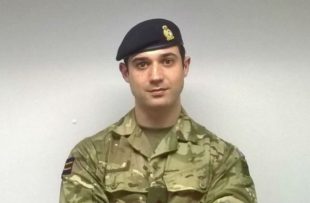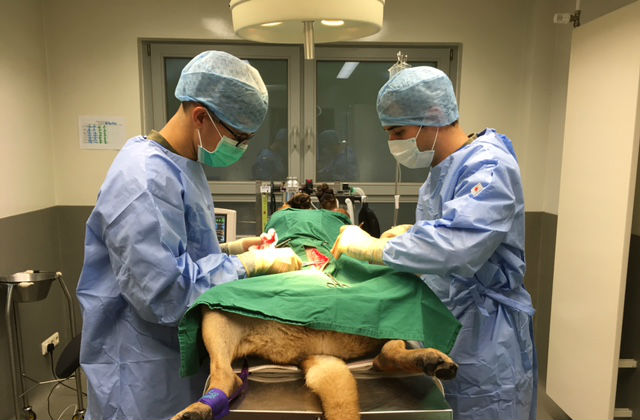
As a Veterinary Officer, I manage the day to day training and administration of a Squadron in 1st Military Working Dog Regiment. This includes the military working dogs (MWDs) health and welfare as well as the MWD handlers training, careers and wellbeing.
After qualifying as a vet in 2014, I worked as a mixed vet for a year before making the decision to become a vet in the Army. Whilst I enjoyed civilian practice, I was keen for a more varied lifestyle and the Royal Army Veterinary Corps (RAVC) offered a unique combination of military life with veterinary work. Having completed the Professionally Qualified Officer course at Sandhurst, I was posted to Sennelager, Germany as a Veterinary Officer/Troop Commander.
Role of the Veterinary Officer
In the clinic, the Veterinary Officer retains full control over the MWD’s welfare, ensuring that the dogs are exercised adequately and that the kenneling is in good condition. A typical day allows me to work with MWDs as a vet; a rewarding challenge, taking full control of their health, diet, exercise and fitness to deploy. An average week would include a full weight check for the Squadron and a walk around the kennels to ensure that the MWD’s welfare is regularly monitored. We also provide emergency veterinary training for the MWD handlers to ensure that the highest level of care is available for our dogs should they require it, whether on Exercise or on Operations or if the Veterinary Officer is unable to reach them.

As a Troop Commander, I also organise some of the varied training sessions to ensure that the MWD fleet is adaptable to different situations on the ground. Varied locations are used with many different situations presented to the MWD handlers and the dogs themselves. The dogs are also trained to remain calm around gun fire and transportable in many different vehicles. On top of this, I manage the soldier’s career progression, reporting on the dog handlers and veterinary nurses annually and provide input into their career management. There are also regular fitness training sessions through the week and these as well as involvement in sports, help you bond as a Squadron and provide chances to travel and partake in sporting events and adventure training in a variety of exciting locations both in the UK and abroad.
As an Army vet I’ve had the opportunity to work with MWDs based around the UK, in Cyprus and in Germany or on exercise around the world. There are also positions for Veterinary Officers in London working with Military Working Horses (MWHs) utilised in parades, and at the Defence Animal Centre which procures MWDs and MWHs and oversees the training of these animals.
